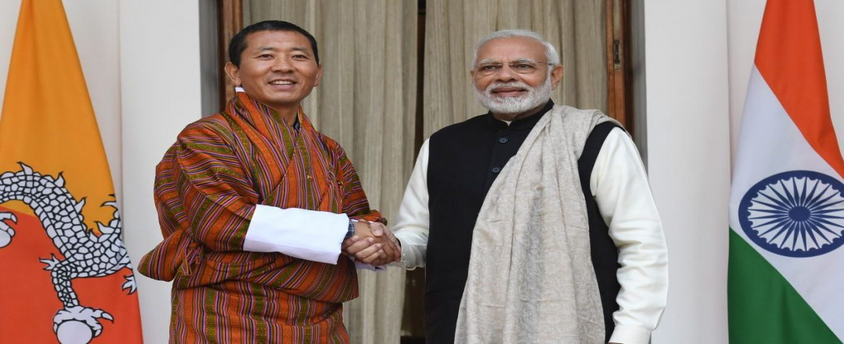India-Bhutan Relations
08, Apr 2023

Prelims level : International Relations
Mains level : GS-II International Relations | Bilateral, Regional and Global Groupings and agreements involving India
Why in News?
- Bhutan’s King Jigme Khesar Namgyel Wangchuck visited India on a three-day visit and held talks with Prime Minister Narendra Modi and President Droupadi Murmu.
- Both countries issued a joint statement detailing cooperation in many areas.
Highlights:
- Prime Minister Narendra Modi and Bhutanese King Jigme Khesar Namgyel Wangchuck discussed the latest situation along the India-Bhutan border as well as the progress in boundary talks between China and Bhutan.
- India has agreed to support Bhutan’s next development plans and extend additional standby lines of credit.
- Bhutan is set to graduate from the list of Least Developed Countries in 2023, and its 21st century Economic Roadmap aims to turn it into a developed country with a per-capita income of $12,000 in the next 10 years.
- Future partnerships could include space research, skilling, startups and STEM education, and a new Internet gateway for Bhutan, in keeping with the Bhutanese king’s new “Transform Initiative”.
Boost to infrastructure projects:
- Hydropower received a boost, with the government agreeing to consider Bhutanese requests for expediting long-delayed projects (Sankosh and Punatsangchhu), revising upwards the tariff on Chhukha, the oldest project, and buying power from the Basochhu power project.
- New infrastructure projects include an integrated checkpoint for trucks at Jaigaon, a checkpoint for third-country nationals and a cross-border rail link from Kokrajhar to Gelephu.
Bhutan-China Nexus:
- The Bhutan-China nexus has been a matter of concern for India, which has close historical and strategic ties with Bhutan.
- China has been trying to establish closer ties with Bhutan, which has traditionally relied on India for its economic and strategic support.
- China’s growing influence in Bhutan could undermine India’s strategic presence in the region and weaken India’s influence over Bhutan. This could also have implications for India’s security, given that Bhutan shares a border with China.
- It could also lead to a shift in the regional balance of power. China’s growing influence in Bhutan could lead to a more assertive China in the region, which could have implications for India’s relations with other neighbouring countries.
- Against the backdrop of Bhutan Prime Minister Lotay Tshering’s comments that China has equal say in resolving the border dispute in Doklam, India has been closely monitoring the situation.
- It also has economic implications for India. Bhutan is a crucial partner for India in the hydropower sector, and any move by China to increase its economic presence in Bhutan could have implications for India’s economic interests in the region.
India-Bhutan relations since Doklam standoff:
- The Doklam standoff in 2017 was a tense military standoff between India and China, which also involved Bhutan, as the disputed territory in question was claimed by both Bhutan and China.
- The standoff highlighted the strategic importance of Bhutan for India and the growing assertiveness of China in the region.
- Since the Doklam standoff, there has not been a significant change in Bhutan’s willingness to discuss the boundary issue with China. Bhutan has traditionally followed a cautious approach in its foreign policy and has relied on India for its economic and strategic support.
- Bhutan has continued to maintain its position of seeking a peaceful resolution to the boundary issue with China through dialogue and diplomacy. Bhutan has also emphasized the importance of respecting its sovereignty and territorial integrity in any discussions related to the boundary issue.
Way Forward:
- Building trust is essential in maintaining a strong and enduring partnership between India and Bhutan.
- Encouraging more exchange programs between the two nations, such as student exchanges, cultural events, and tourism, can help build understanding and trust between the people of India and Bhutan.
- Building upon the strong economic ties between the two nations by increasing trade and investment can foster mutual benefits and build trust.
- India can continue to provide technical and financial assistance to Bhutan in its efforts to achieve its developmental goals, including in infrastructure, health, education, and rural development.
- India and Bhutan can work together to promote peace, stability, and prosperity in the region by cooperating on regional issues, such as counter-terrorism, climate change, and disaster management.






